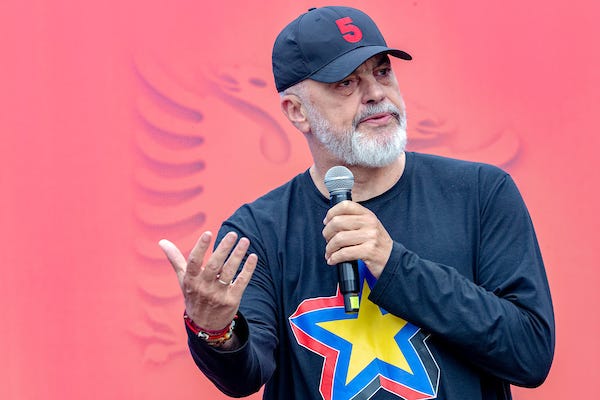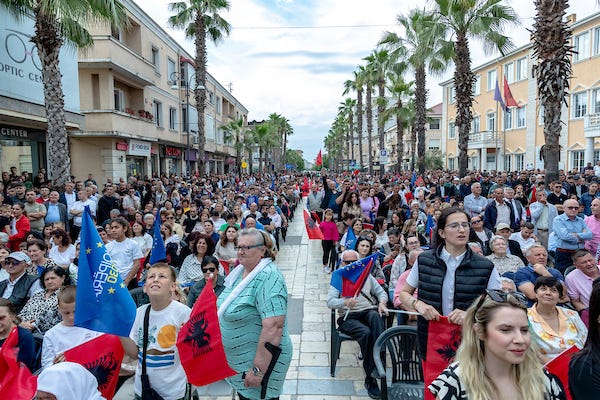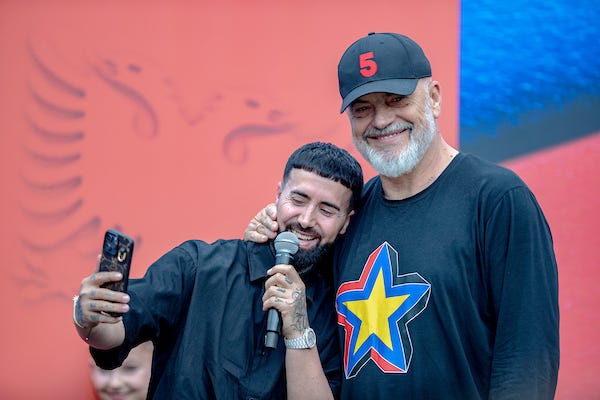Two Campaign Rallies, One Fractured Democracy
In Albania, democracy wears a mask. Rama's stage-managed control clashes with Berisha's chaotic nostalgia, while citizens watch, whisper, and wonder if anything will ever change.
On two symbolic days in early May, I travelled across Albania to attend campaign rallies of the nation's leading political parties. These were not mere events; they were performances revealing, theatrical, and deeply symptomatic of a democracy caught between image and reality. In Kavajë, the Socialist Party, under the ironclad grip of Prime Minister Edi Rama, paraded order and grandeur with an iron glove; in Shkodër, the opposition Democratic Party, under the ageing yet defiant Sali Berisha, sought fervour in nostalgia, free movement and open streets. The experience of covering both, unannounced and unaccompanied, was a lesson in contrasts.

Kavajë: A Theatre of Control
Located just under an hour's drive from Tirana, Kavajë is not unfamiliar with the thrum of political procession. Yet, on this particular Tuesday, the town seemed commandeered. Driving in, I saw a convoy of nearly 100 cars stationed on the outskirts, many of them brought in from neighbouring suburbs, assembled as if to give the illusion of spontaneous public enthusiasm.
The centre of Kavajë had been cordoned off like a foreign embassy under threat. Police in navy uniforms, security agents in civilian clothing with discreet earpieces, and a perimeter of rigid metal barricades transformed the square into a fortress. The atmosphere was tense, but not with anticipation, with surveillance.
When I approached the main square, I was intercepted by security officers. I identified myself as a freelance journalist, showed my press credentials, and explained my purpose. But that wasn't enough. "You must have an invitation," they said. It was a public square, and yet access was by personal validation.
Eventually, I managed to reach out to the Prime Minister's press office. A representative named Ms Hasa attempted to assist. After some back-and-forth, I was cleared to proceed, though under strict surveillance. I was allowed to circle the crowd but instructed not to approach the Prime Minister under any circumstances.
Even then, I was being watched. As I sat on a bench making notes, a man in dark glasses sat beside me, occasionally glancing at my phone. When I moved to another part of the square, I noticed another individual following me and doing the same. Their presence suggested an interest not solely in security, but perhaps in monitoring the information being gathered.
Within the crowd, a cross-section of Albanian society milled. Some smiled, others remained impassive. I spoke to about ten individuals, all of whom refused to be named. One man told me, with a resigned expression, that he barely managed to put food on the table. A teenager said his dream of becoming a swimmer was pointless without political connections.
One woman explained that she was only there because she was "invited" by the local party office. Another teenager expressed doubt that education would yield any opportunities. "It doesn’t matter what I study," he said. "You need connections to get a job."
In Kavajë, the physical setting mirrored the political mood. As Rama's convoy approached, street cleaners appeared, brooms in hand, sweeping the roads with unusual diligence. Locals noted that the city only seemed to be cleaned when Rama was scheduled to appear.
When the Prime Minister finally ascended the stage, his message was draped in EU symbolism, blue flags with golden stars fluttering in the breeze. But the tone of his speech betrayed the spirit of unity. Rama launched into a scathing attack on his chief opponent, Sali Berisha. He called him a "bouffon", mocking his past, his party, and even a barber shop near the rally site that displayed Democratic Party posters.
The speech drew cheers, but they felt rehearsed. Rama spoke of inclusivity, but his language dripped with derision. Despite the ornamental banners of progress, the rally felt hermetically sealed from the country’s pressing realities.







